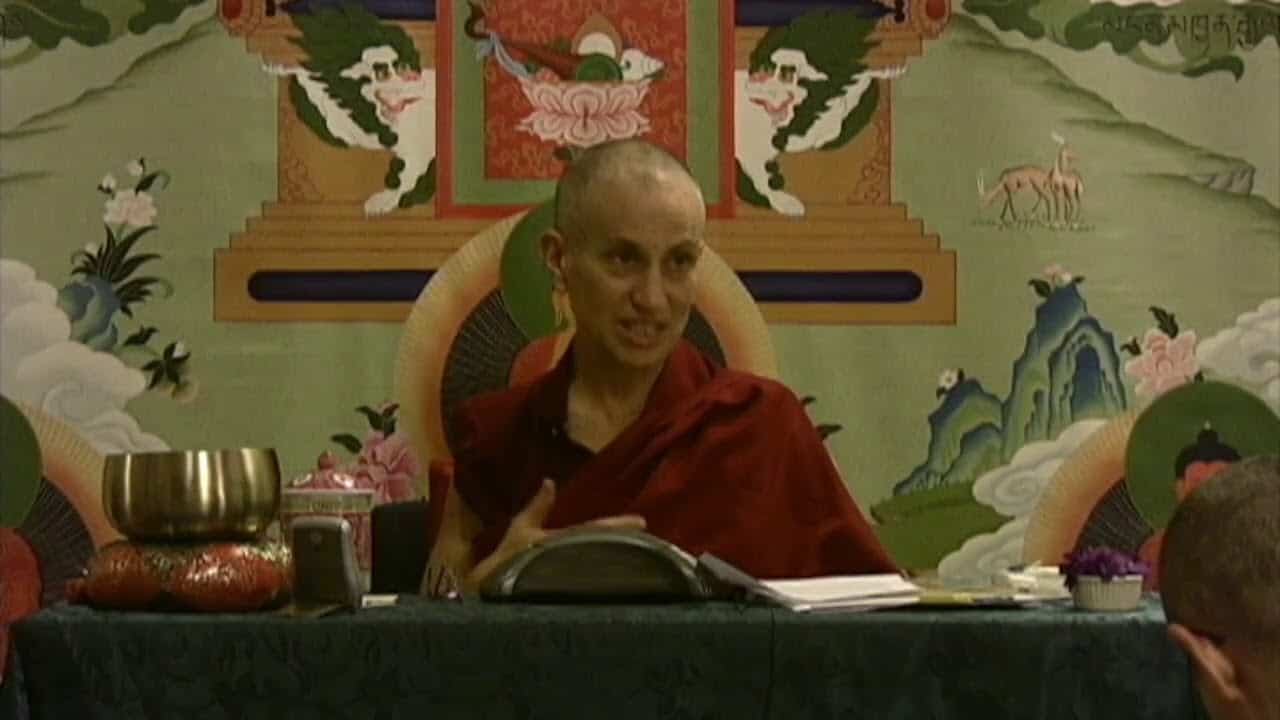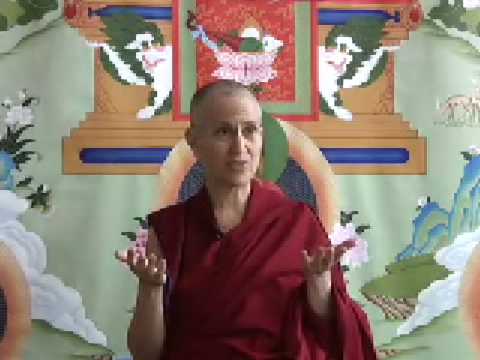Practicing bodhicitta
- Making our practice of bodhicitta personal
- Not getting caught up with worldly expectations
- Overcoming the complaining and critical mind
- Feeling connected to all sentient beings
I was thinking a little bit about Christina’s question last night, about how renunciation and the wish for liberation is the motivation to attain liberation or arhatship, and how bodhicitta is the motivation to attain full enlightenment for the benefit of sentient beings. I was thinking that when we generate bodhicitta, what we’re doing at the beginning of every meditation session, which we all do many times a day, try not to make it some abstract thing, but look at the people around you and think, “I am practicing for their benefit,” because sometimes when we live together in a community or even at a Buddhist center, we think, “Here’s everybody else who’s practicing and we’re all practicing to attain enlightenment,” as if we’re all doing our own practice for our own goals and our own liberation, but hardly ever do we look at the people around us and say, “I’m practicing for their benefit.”
We normally don’t make it so personal; we make it kind of abstract. But making it personal is very, very helpful, and I do this often when I’m in airports. I look around at the people, they’re doing so many things; they’re buying yogurt, they’re feeding their kids, they’re complaining to the airlines, they’re rushing here and there, and I just walk by and I think, “I’m practicing for these people.” I mean this is real, this is serious. It’s like they are real sentient beings, and whether they’re happy or miserable is going to depend on me, and especially in the long run if they’re in samsara or not in samsara that depends on me; therefore, I’m practicing in order to benefit them. That adds some juice to the practice instead of making it so abstract.
When we think to ourselves that we’re practicing for the benefit of others, that’s nothing to be proud of and that’s nothing to think about in this way: “I’m practicing for their benefit, so they should be grateful! I’m developing love and compassion for them, so they should really respect and treasure me,” or, “I’m doing the taking and giving meditation, so they should be happy that I’m thinking of them and taking on their suffering.” We should not think like that. That is not the proper way to think, because clearly bodhicitta has to be free of arrogance and expectation and the worldly Dharma of wanting reputation, approval, and praise for what we’re doing. Just to really practice for that long-term goal of enlightenment for the benefit of each and every being around.
When you’re taking walks, and you look at the turkeys, look at each turkey and [think], “I’m practicing so that I can help this turkey be free of samsara, because this turkey hasn’t always been a turkey; they once were my mother and they once had all the mental faculties that enable us to speak to each other in the same way we speak and communicate with each other now—they haven’t been some turkey their whole life, all of their existence. We’ve had this relationship and they’ve been kind, so what I’m doing is important. My practice isn’t just for me.” Similarly, when we’re here in community it’s not like we’re just helping each other so we can all attain our own goals of our own individual enlightenment. No! [laughter] We all have to attain our own enlightenment, but we’re helping each other so that each of us can help all sentient beings. We’re practicing for each other; we’re practicing for all beings.
Thinking like this is very helpful when there is somebody that you don’t like, or somebody you don’t get along with, because we easily see all that person’s faults. There’s this and there’s that. “Ra, ra, ra, ra,” and we complain about them, but if we think, “I’ve got to practice the Dharma in order to attain the realizations that will enable me to show them the ways to overcome their faults,” then this puts a whole new perspective on the whole thing.
In other words, I can’t sit there and criticize them because they have these faults, and just say, “Nya, nya, nya, why don’t you correct them.” I’ve got to put some energy in there to attain the realization, so that I can help them correct their faults, because who is it that suffers from their faults? I think it’s just me, but actually it’s them because their faults send them to horrible rebirths, their faults keep them trapped in cyclic existence, so actually they suffer much more from their faults than I do. Rather than dwell on their faults, and complain about them, and be ego sensitive about their faults, to really think, “If I want to do something, I need to attain the compassion, the wisdom, the skill, the power of a Buddha to be able to help these beings, because they suffer immensely because of the afflictions in their own mind, and the actions that those afflictions cause them to do.
Think about this because it completely changes when we generate bodhicitta at the beginning of each of our meditation sessions, so look at the bugs, look at the insects, and look at all the people who come to work in Gotami House, or who haven’t come today to work in Gotami House! The people who, I mean, I was amazed yesterday that they were out here shoveling snow on Christmas. I hope you took some candy to the department; I mean these guys are amazing! To really feel connected with all the people and living beings around us.
Venerable Thubten Chodron
Venerable Chodron emphasizes the practical application of Buddha’s teachings in our daily lives and is especially skilled at explaining them in ways easily understood and practiced by Westerners. She is well known for her warm, humorous, and lucid teachings. She was ordained as a Buddhist nun in 1977 by Kyabje Ling Rinpoche in Dharamsala, India, and in 1986 she received bhikshuni (full) ordination in Taiwan. Read her full bio.


